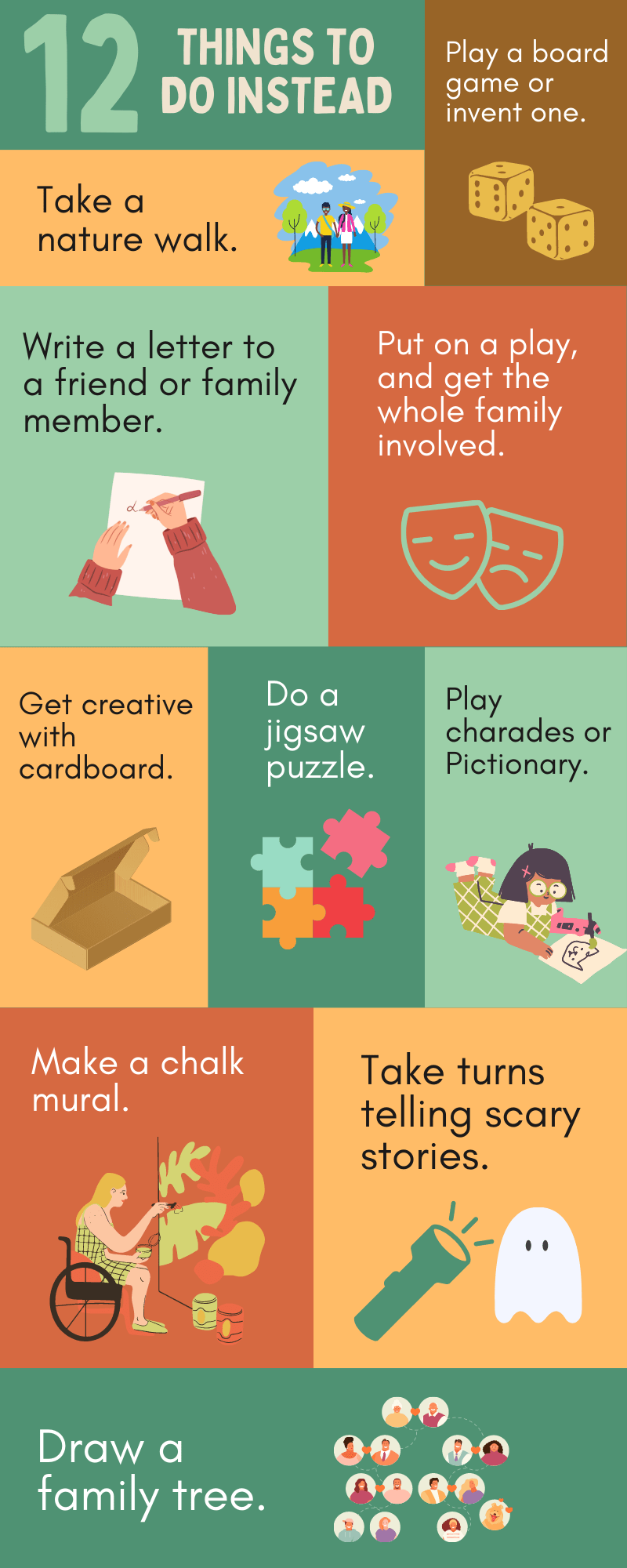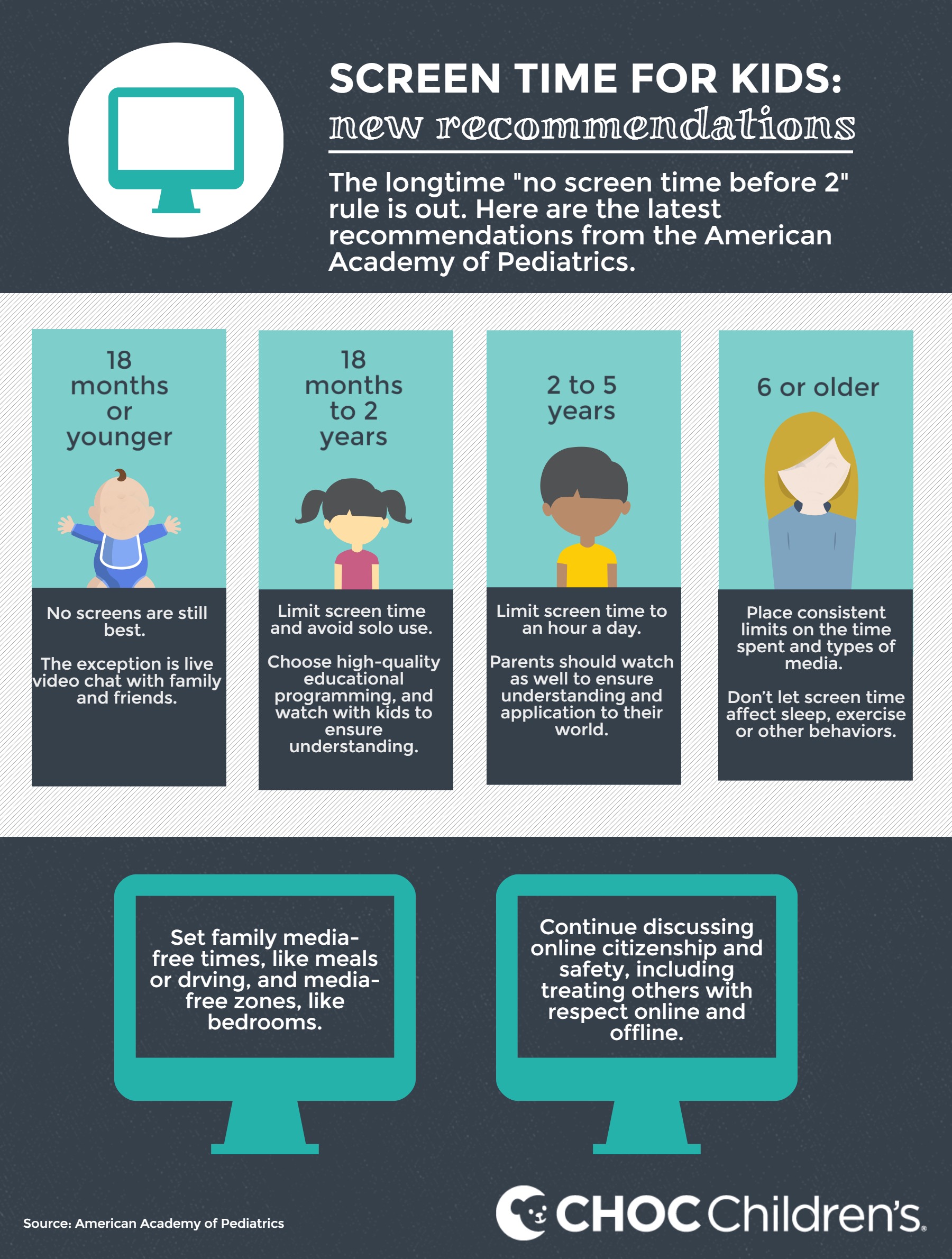Take our pledge to be screen free!
There is no denying that screen culture has changed the way we do things. We can meet with our doctors, order dog food for home delivery, and catch up on our favorite stories all from home in our most comfortable spot. Unfortunately, there is also a downside to the exposure of screens.
Smartphones and other device screens (televisions, laptops, and tablets) have been proven to interfere in parental interactions with children. This can directly affect not only relationships but also childhood development, according to several published studies as well as information currently recommended by the American Academy of Pediatrics. Too much screen time has been directly linked to obesity, irregular sleep patterns, behavioral problems, impaired academic performance, violence and less time for play.
Visit the American Academy of Pediatrics for age-based recommendations on screen time and tips for creating enriching screen experiences, or check out this graphic.
Stumped on where to find screen-free fun? We've compiled some easy activities to try at home. Make sure to include the whole family in the fun—grown-ups need a break from screen time too.
Library Resources for Screen Free Fun
- Visit the library for a Screen Free Summer Spree
- Check out a storytime kit and create your own storytime. Kits include a book, a selection of rhymes, a puppet and a CD.
- Explore the attractions around you with a Michigan Activity Pass that offers free access to hundreds of parks, museums, theaters, and more across the state
- Check out a puppet (or two, or three) and put on a puppet show at home
- Read a book together—check out some of our librarians' favorite read aloud stories
Other Screen Free Fun

- Play a board game or make up a new game. What are the rules? How do you win?
- Put on a play using things you have at home for props, costumes and sets. Try to find a way for the whole family to get involved—you might need a writer, a set designer, or a costume designer.
- Take a nature walk in your neighborhood or a park. Talk about what you see, hear, smell and feel.
- Check out a kid-friendly cookbook and make a recipe together
- Write a letter to a friend or family member. Make sure you ask them to write back!
- Get creative with cardboard boxes. Can you make a fort? How about a car? A space ship?
- Do a jigsaw puzzle
- Make a chalk mural in your neighborhood
- Play charades or Pictionary
- Take turns telling scary stories. Make it even better by using a flashlight in the dark.
- Draw a family tree
- See where you can go on just one tank of gas
Recommended Reading
Screens are not just an issue for kids; studies have shown an increasing addiction level to screens for adults as well. For more information on screen time issues and solutions, please check out our references and recommended reading below.
52 Alternatives to Screen Time – Turn off those screens and start having fun with these 52 entertaining activities. In a compact package that's easy to use at home or on the go, this deck allows users to unplug and engage in offline activities like scavenger hunts, marble mazes, charades, and more.
Reset Your Child's Brain – Increasing numbers of parents grapple with children who are acting out without obvious reason. Interactive screens, including video games, laptops, cell phones, and tablets can overstimulate a child's nervous system. While no one in today's connected world can completely shun electronic stimuli, author Dunckley shows how the most vulnerable amongst us can and should be spared their damaging effects.
Calmer, Easier, Happier Screen Time – Do you constantly find yourself battling to stop your kids from spending hours in front of a screen? Using the latest scientific research to show just how addictive the digital world can be for the developing brain of a child, author Janis-Norton shows the calmer, easier, happier techniques to help parents wean their children away from their electronic devices and get back in charge.
Ultimate Kids' Guide to Staying Healthy – Kids of all ages have some important questions about how their bodies work. Dr. Nina Shapiro embarks on an amazing journey through the body as it gets fed, protected, exercised, cleaned, energized, and rested. Each chapter provides kids with age-appropriate explanations and illustrations that address their very good questions about their bodies and health with solid (and fun!) science-based answers.
How Digital Technology Shapes Us – Many are concerned about the amount of technology in people's lives these days and whether or not we are spending way too much time on screens. Professor Indre Viskontas provides a scientific approach to judging the true pros and cons of our interaction with technology in the digital age. With this information, we can focus on the positives of digital media, and feel empowered to connect with others to find purpose, motivation, and support.
References:
Bradley Ruder, D. (2019). Screen time and the brain. Harvard Medical School Publishing. Retrieved from https://hms.harvard.edu/news/screen-time-brain
Christensen, J. (2021). Children and screen time: How much is too much? Mayo Clinic Health System. Retrieved from https://www.mayoclinichealthsystem.org/hometown-health/speaking-of-health/children-and-screen-time
Elson, M., Ferguson, C. J., Gregerson, M., Hogg, J. L., Ivory, J., Klisanin, D., Markey, P. M., Nichols, D., Siddiqui, S., & Wilson, J. (2019). Do policy statements on media effects faithfully represent the science? Advances in Methods and Practices in Psychological Science, 2(1), 12–25. https://doi.org/10.1177/2515245918811301
McCarthy, C. (2018). Why we all really need Screen-Free Week this year. Harvard Health Publishing. Retrieved from https://www.health.harvard.edu/blog/why-we-all-really-need-screen-free-week-this-year-2018050113752
Moyer, M. W. (2022, April 23). Here to Help; Helping Kids Be Smart about Screen Time and Social Media. The New York Times, A3.
Przybylski, A. K., & Weinstein, N. (2019). Digital Screen Time Limits and Young Children’s Psychological Well-Being: Evidence From a Population-Based Study. Child Development, 90(1), e56–e65. https://doi.org/10.1111/cdev.13007
Screen time and children (2020). American Academy of Child & Adolescent Psychiatry. Retrieved from https://www.aacap.org/AACAP/Families_and_Youth/Facts_for_Families/FFF-Guide/Children-And-Watching-TV-054.aspx





Add a comment to: How Much Screen Time is Too Much?